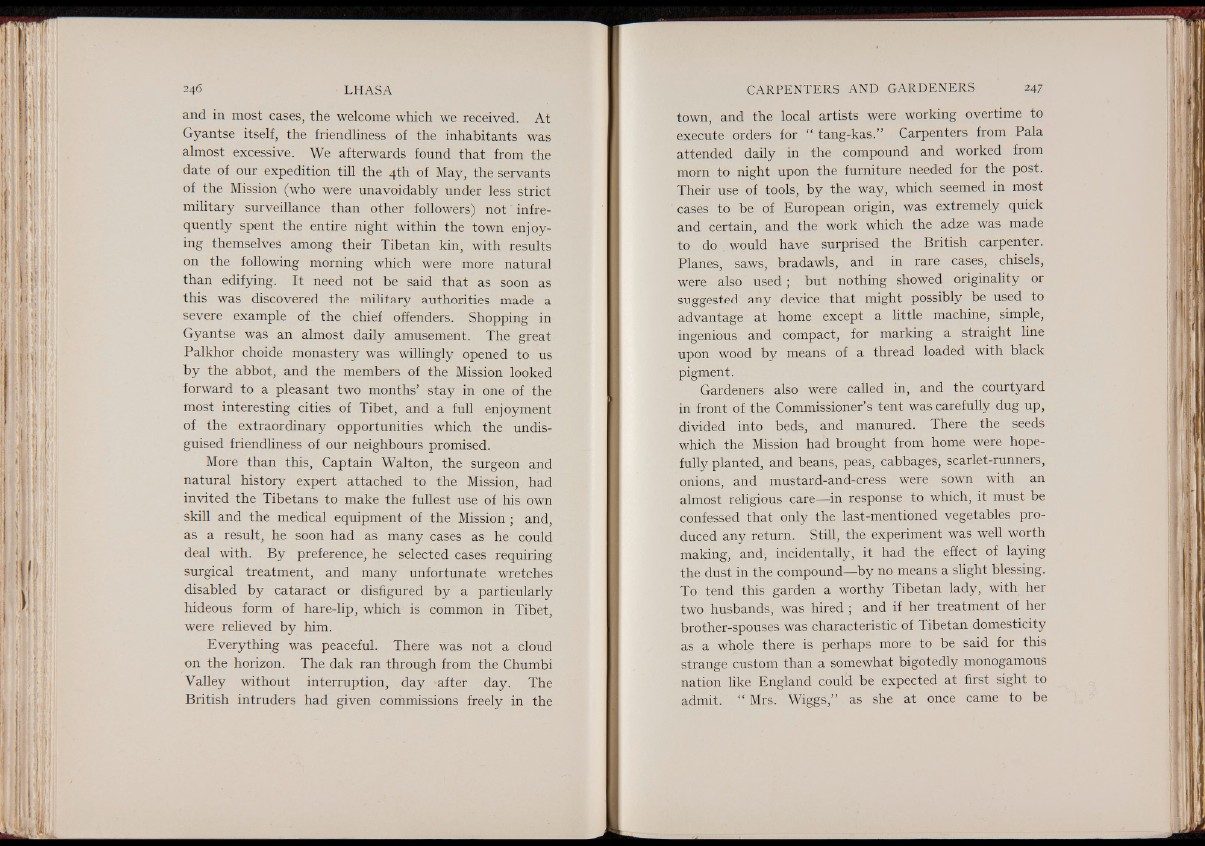
and in most cases, the welcome which we received. At
Gyantse itself, the friendliness of the inhabitants was
almost excessive. We afterwards found that from the
date of our expedition till the 4th of May, the servants
of the Mission (who were unavoidably under less strict
military surveillance than other followers) n o t' infrequently
spent the entire night within the town enjoying
themselves among their Tibetan kin, with results
on the following morning which were more natural
than edifying. It need not be said that as soon as
this was discovered the military authorities made a
severe example of the chief offenders. Shopping in
Gyantse was an almost daily amusement. The great
Palkhor choide monastery was willingly opened to us
by the abbot, and the members of the Mission looked
forward to a pleasant two months' stay in one of the
most interesting cities of Tibet, and a full enjoyment
of the extraordinary opportunities which the undisguised
friendliness of our neighbours promised.
More than this, Captain Walton, the surgeon and
natural history expert attached to the Mission, had
invited the Tibetans to make the fullest use of his own
skill and the medical equipment of the Mission ; and,
as a result, he soon had as many cases as he could
deal with. By preference, he selected cases requiring
surgical treatment, and many unfortunate wretches
disabled by cataract or disfigured by a particularly
hideous form of hare-lip, which is common in Tibet,
were relieved by him.
Everything was peaceful. There was not a cloud
on the horizon. The dak ran through from the Chumbi
Valley without interruption, day after day. The
British intruders had given commissions freely in the
town, and the local artists were working overtime to
execute orders for “ tang-kas.” Carpenters from Pala
attended daily in the compound and worked from
morn to night upon the furniture needed for the post.
Their use of tools, by the way, which seemed in most
cases to be of European origin, was extremely quick
and certain, and the work which the adze was made
to do would have surprised the British carpenter.
Planes, saws, bradawls, and in rare cases, chisels,
were also used; but nothing showed originality or
suggested any device that might possibly be used to
advantage at home except a little machine, simple,
ingenious and compact, for marking a straight line
upon wood by means of a thread loaded with black
pigment.
Gardeners also were called in, and the courtyard
in front of the Commissioner’s tent was carefully dug up,
divided into beds, and manured. There the seeds
which the Mission had brought from home were hopefully
planted, and beans, peas, cabbages, scarlet-runners,
onions, and mustard-and-cress were sown with an
almost religious care-ijin response to which, it must be
confessed that only the last-mentioned vegetables produced
any return. Still, the experiment was well worth
making, and-, incidentally, it had the effect of laying
the dust in the compound— by no means a slight blessing.
To tend this garden a worthy Tibetan lady, with her
two husbands, was hired; and if her treatment of her
brother-spouses was characteristic of Tibetan domesticity
as a whole there is perhaps more to be said for this
strange custom than a somewhat bigotedly monogamous
nation like England could be expected at first sight to
admit. “ Mrs. Wiggs,” as she at once came to be